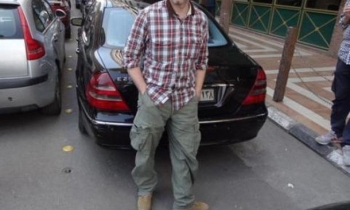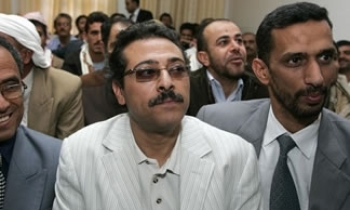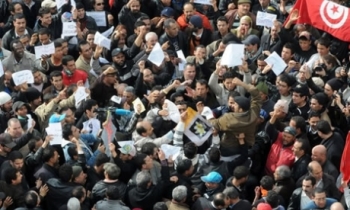Russian journalist Anna Politkovskaia was murdered shortly after she entered her apartment building in central Moscow on Oct. 7. The building's security system was in working order, and she pushed the right buttons to open the door. The assassin was waiting inside. His slim figure was caught on security video.
Politkovskaia's murder was one of many. On Oct. 16, Anatoly Voronin, financial director of Russia's leading news agency ITAR-TASS, was found knifed to death in his apartment. On Sept. 13, Andrei Kozlov, deputy director of Russia's Central Bank, was killed while exiting a sports event.
Politkovskaia has been called "the conscience of Russian journalism" by the deputy editor of Novaia Gazeta, the daily newspaper for which she wrote. She was the only Russian intellectual seriously engaged in exposing to the world the unspeakable doings of the Russian security forces in Chechnya: routine kidnapping and torture of men, women and children whose mutilated bodies have occasionally been found by relatives. She was universally trusted, and her mediation might have prevented hundreds of casualties during the various hostage takings in Russia. But she was not allowed to mediate. In 2004, rushing to Beslan to avert the crisis, she was mysteriously poisoned (as President of Ukraine Viktor Yushchenko had been at the start of the Orange Revolution). She was probably the most fearless and noble journalist alive in the world. Her book, A Small Corner of Hell: Dispatches from Chechnya, was published in English in 2003.
Respected Russian political commentator Evgeniia Albats drew a parallel between Politkovskaia's murder and the murder of communist leader Sergei Kirov in 1934. That murder unleashed Stalin's well-known purge of the Communist Party, which culminated in the show trials of Politburo members and other party leaders.
It is significant that Politkovskaia's murder generated no more than a tone of subdued indignation in the American and European media. Frankfurter Allgemeine Zeitung and Le Monde gave it a few sideshow articles that promptly disappeared from their homepages. The Moscow online gazeta.ru removed mentions of Politkovskaia the day after her funeral. Our own media reported President Bush's subdued call for the murder's investigation, answered by President Putin's chilling assertion that an "objective" investigation would be forthcoming.
As a Russia scholar, I am not all that interested in who Putlin's police might eventually display as Politkovskaia's murderer. Whether the real murderer or someone who merely confessed to the murder, such a person will carry a lesser moral guilt than those who planned and organized the deed. The same applies to the ongoing Chechnya atrocities that have long disappeared from the front pages of world newspapers, and with Politkovskaia's passing may disappear for good from the world's memory.
What is of interest is who stands behind the hired killer. The fact that the murder took place on Putin's birthday invites speculation about Putin's admirers in Russia (and they are many): "the strong hand," which has become proverbial in Russia and which has been desired by quite a few Russians, has again made its appearance.
And the second question: Why so little indignation and attention spent on Polit-kovskaia in Russia and abroad? Whence the restrained tone in which the Western media and politicians condemned the murder?
Let me offer a scenario. In the post-Soviet and terrorist-ridden world, the superpowers seem to be looking backward to the 19th century, when great empires ruled the world and the rest of humanity acquiesced after countless failed uprisings. After the First World War there came an era of democracy, brutally broken by the rise of Nazism. After the Second World War, apart from the communist menace that made first world countries uncomfortable (not to speak of the hardships of Eastern and Central Europe under Soviet military domination), democracy surged forward, with more and more rights gained by more and more minorities in the noncommunist world.
The 20th century gave suffrage to women. It gave American blacks a taste of real equality, and it liberated many Asian and South American countries from dictatorial regimes. After the fall of communism, Eastern and Central Europe gained an opportunity, in Boris Yeltsin's words, to "grab as much freedom as they were able to swallow." All of them did except, as Mikhail Khodor-kovsky's imprisonment and Politkovskaia's murder have illustrated, the Russian Federation.
The fact that Russians took the path of make-believe democracy says a great deal about the Russian political culture. It may also be an indication of Russian political brilliance exemplified by President Vladimir Putin. Putin's evil brilliance consists in understanding that powerful nations once again are poised to rule the world.
The Russo-German alliance on energy defies the spirit of the European Union whose founders envisaged a united European front on major political and economic problems. Now Russia wants Germany to be its energy distributor and watchdog in the EU. This puts the EU out of whack, as countries such as Poland and the Baltic republics are left out of the planned gas pipeline to be built at the bottom of the Baltic Sea. Have the world leaders forgotten that it is crucial to the stability of Europe to guarantee stability and liberty in non-Germanic Central Europe?
The answer is yes. Winston Churchill's infamous division of the world into "giants" and "pygmies" seems to be falling in place again. The increasingly nationalistic world powers seem once again to be betting on their strength in controlling smaller nations. International treaties and agreements are still being signed and are ostensibly honored, but unilateral actions by the great powers have become more and more frequent. The United Nations has been sidelined on too many occasions, its resolutions ignored by the strong nations and enforced only when the strong want to see them enforced.
The North Korean crisis illustrates this. The United Nations is powerless to change the course of that country. The United States has to lean on China to effect pressure on Kim Jong Il. As Robert Kaplan recently noted, China would welcome a satellite state on the Korean peninsula, but that would not be in the interest of Russia, which has a history of strong ties with North Korea in the communist period, and is viewing the country as a potential pipeline route for its oil and gas. Neither China nor Russia wants the rest of the world to have a say in North Korean developments. They signed off on the U.N.-imposed sanctions, but insisted that military action not be included.
Are we going back to the 19th century, when the white empires brutalized white minorities within their own borders while treating the nonwhite rest of the world as a back yard to be used as they saw fit?
To be sure, the great powers today are not the same as 150 years ago. The rise of China, the assertive voices of some of the mid-size powers such as Brazil, South Korea and Japan change the picture somewhat. But the trend seems to be backward rather than forward. It is this trend that accounts for the relatively scant attention paid to Polit-kovskaia's murder. Like 19th century revolutionaries, she was an inconvenience to be crushed.
The great powers do not blame the Russian government, because they are getting ready — or indeed have been more than ready — to engage in liberty-reducing actions within their own borders. They therefore studiously avoid blaming Russia for its brutality, for Russia is poised to join the concert of nations from which its own excesses dislodged it in the early postcommunist era.
Politkovskaia's murder may signal a return to the undemocratic past when the rich and the powerful openly used their might against the rest of the world.
Thompson is research professor of Slavic studies at Rice University.









